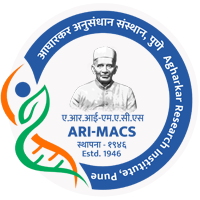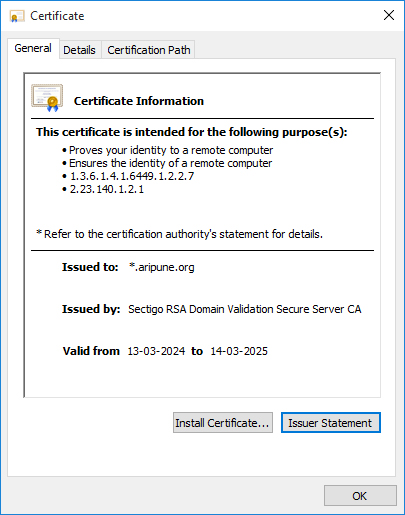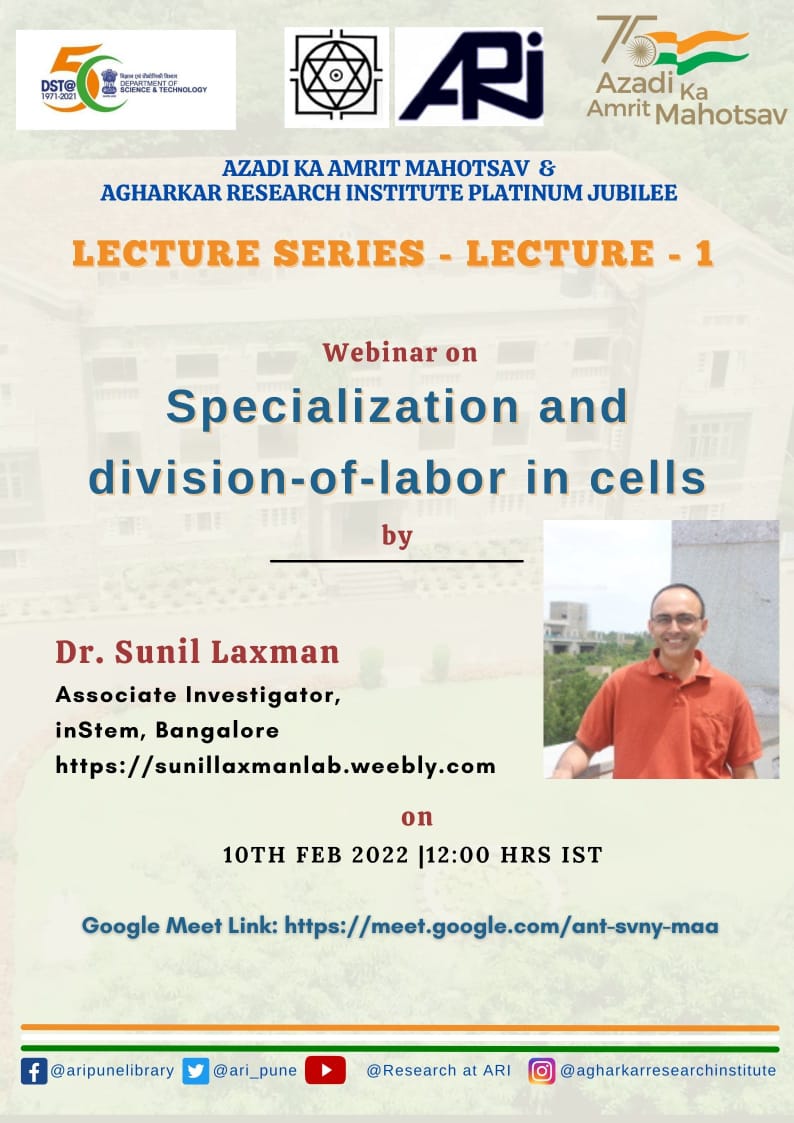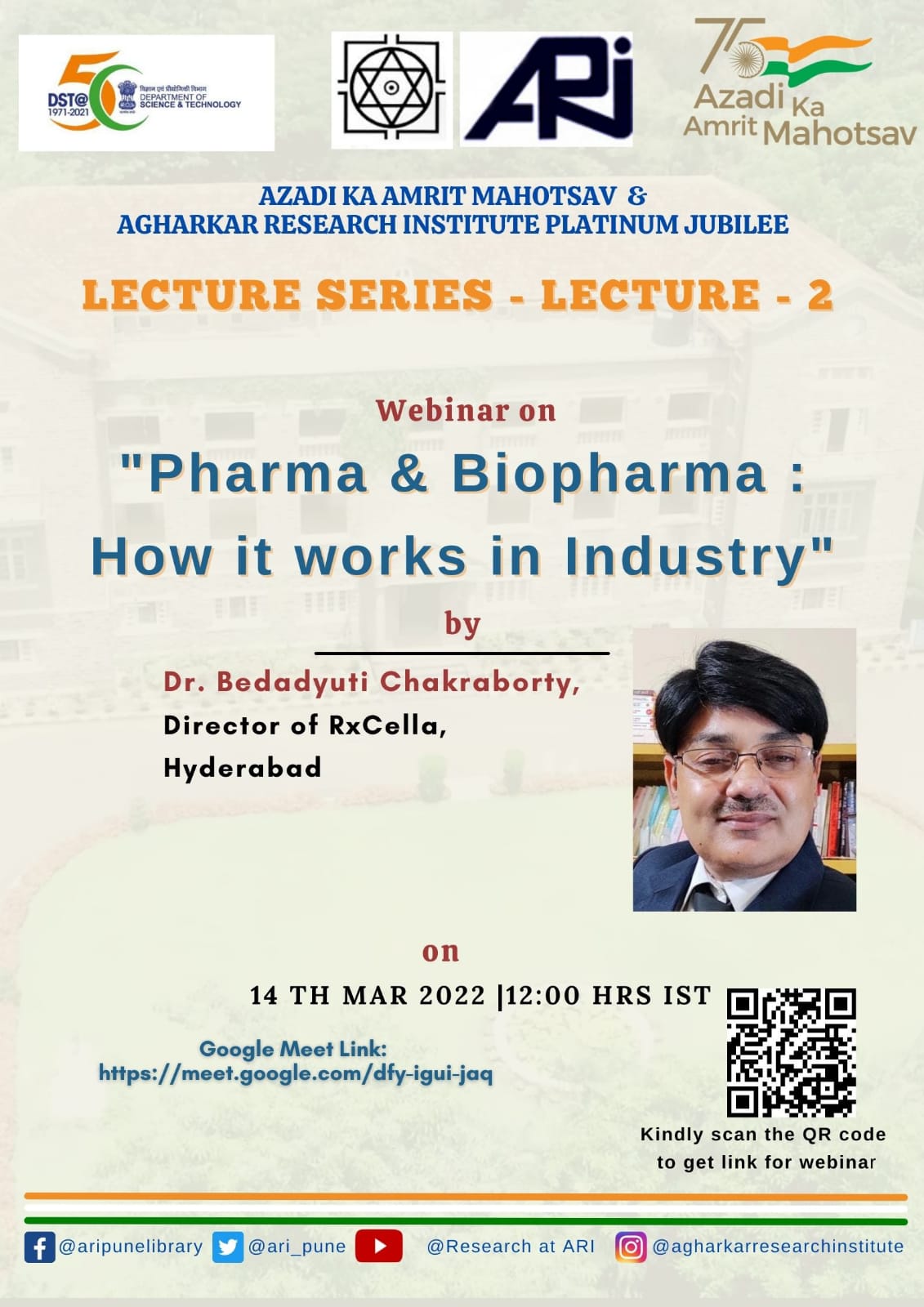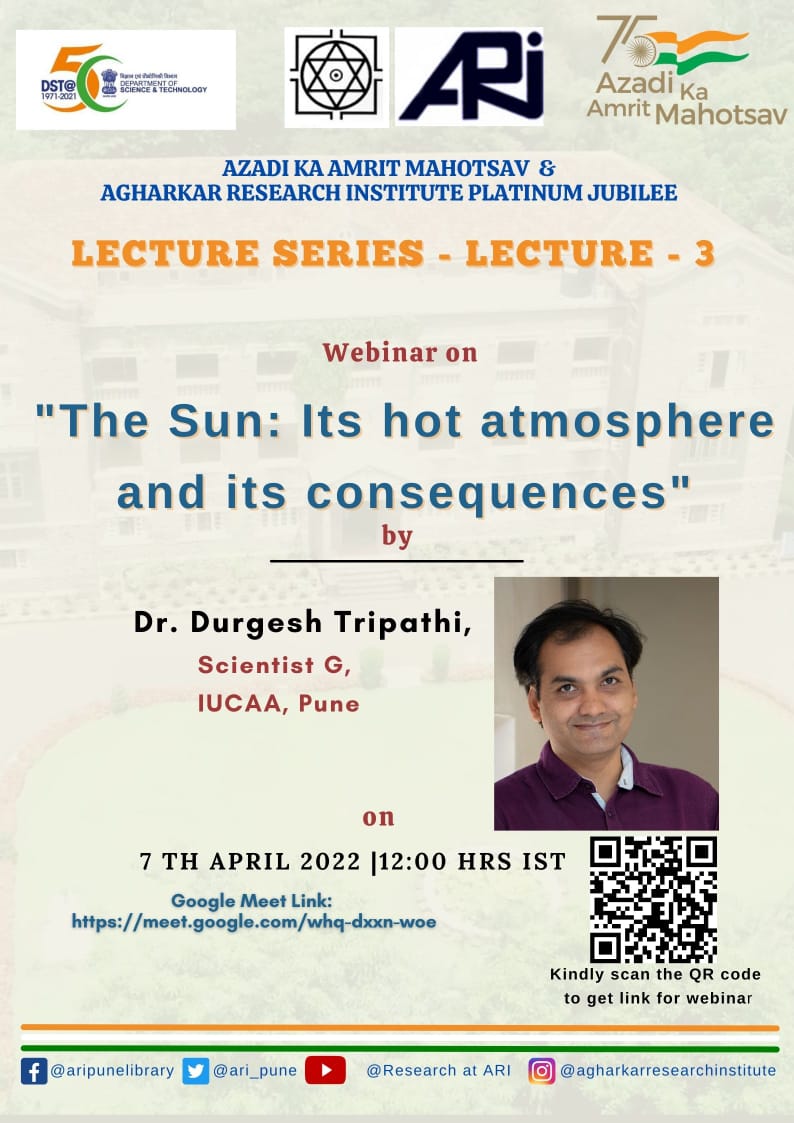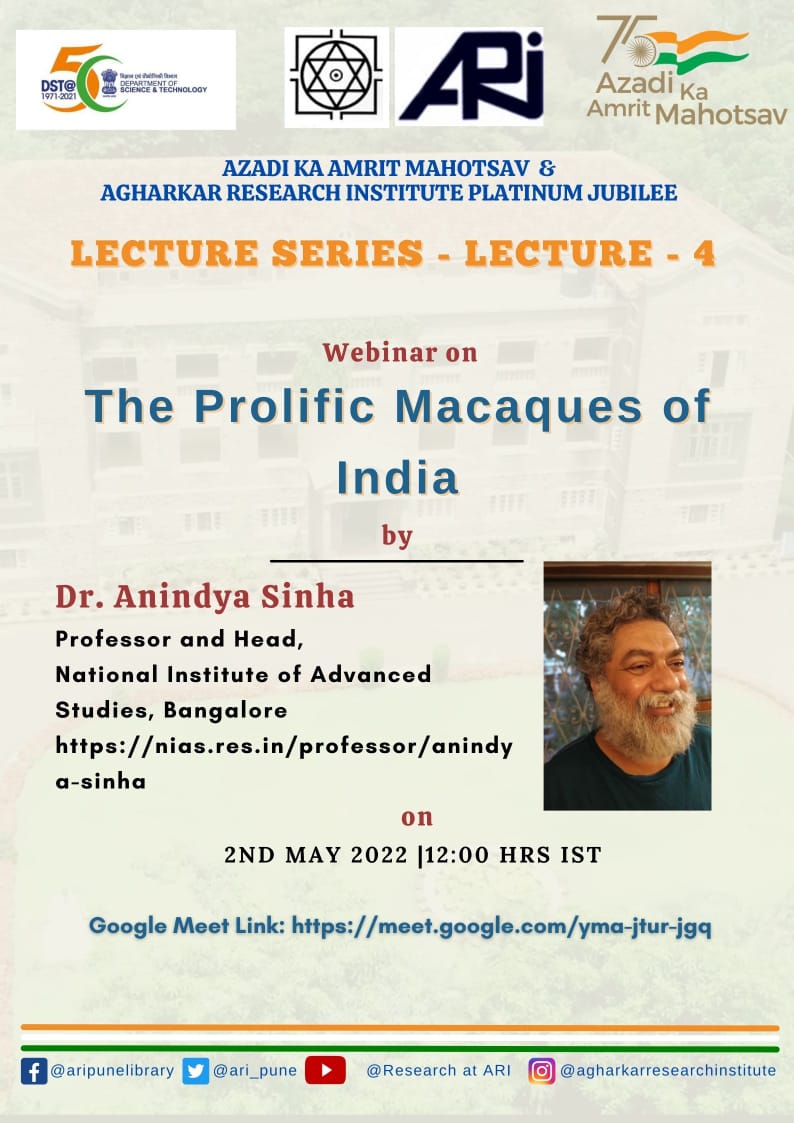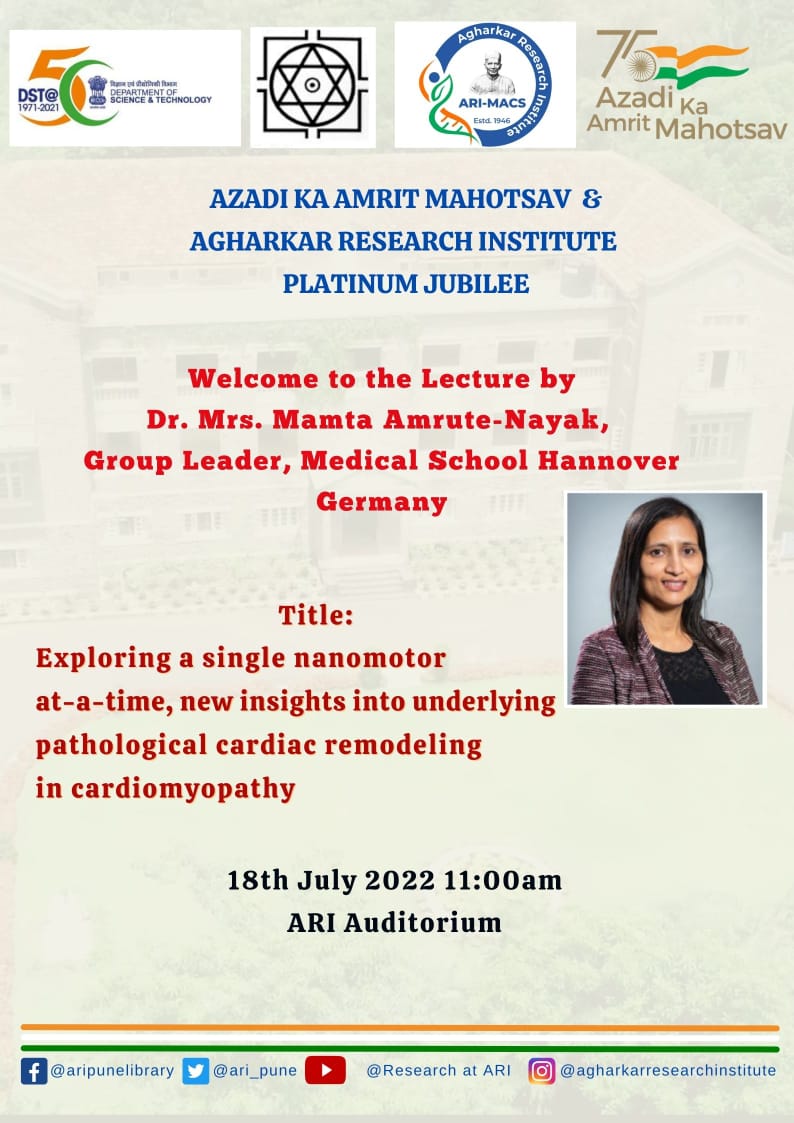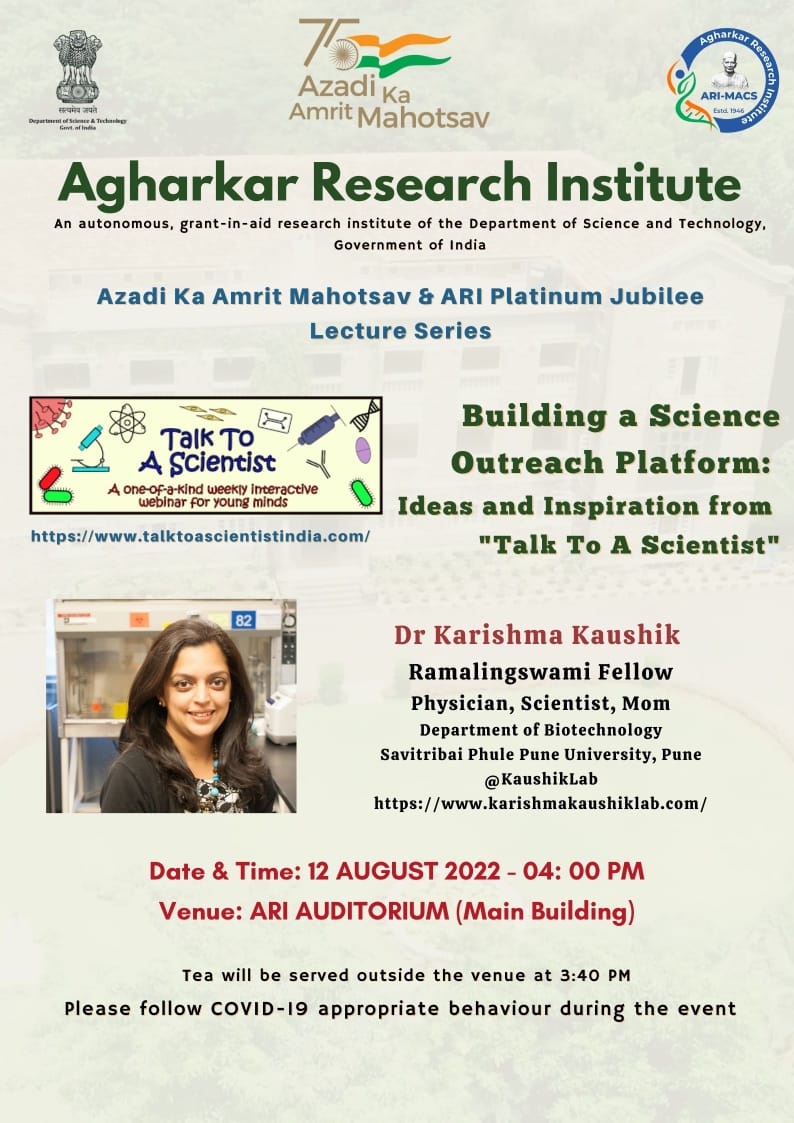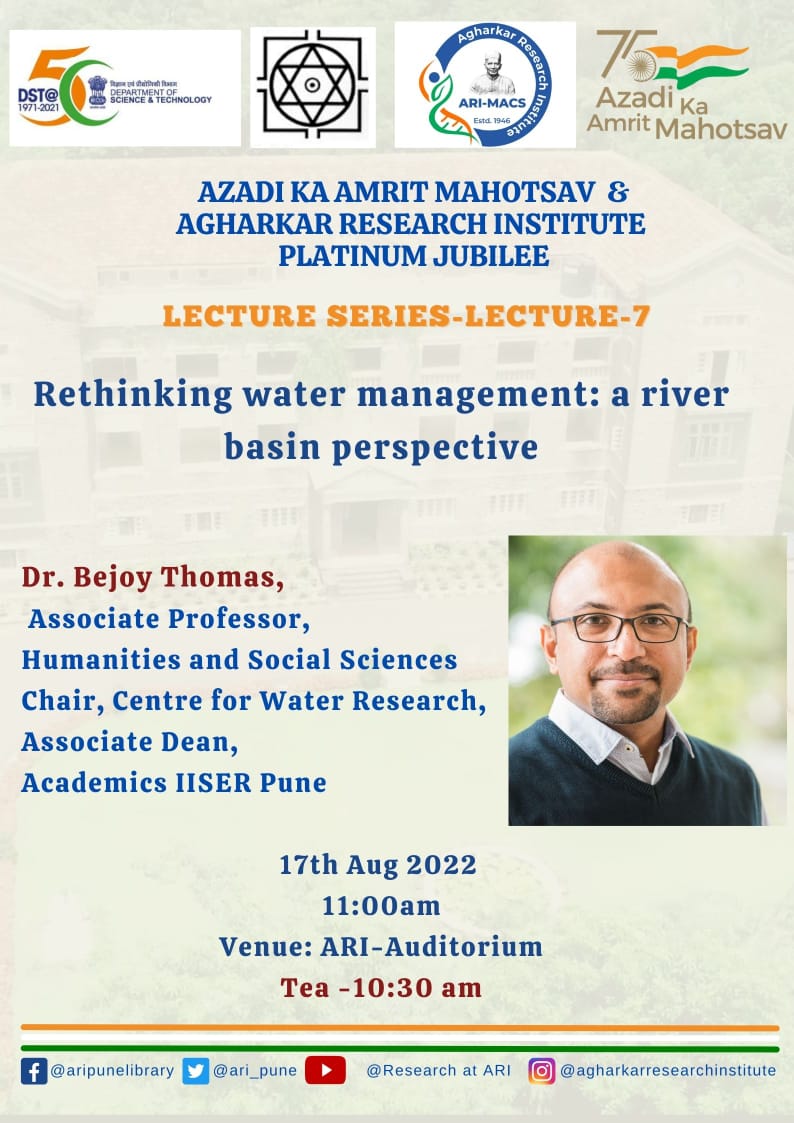
Google Scholar / Social Media
Name : Dr. Kamlesh Jangid
Designation : Scientist E
Brief Background :
Dr. Kamlesh Jangid is a trained microbiologist and an expert in the fields of microbial systematics and ecology, and soil science. He completed his education in Microbiology from the University of Pune in 2005 with a Ph.D. from the National Centre for Cell Science (NCCS) followed by post doctorate in soil microbial ecology with Prof. William Whitman at The University of Georgia, Athens USA. Later, he served NCCSas a Scientist for over a decade and headed the genomics & bioinformatics as well as the PCR diagnostics division at HiMedia Laboratories. At ARI since 2023, Dr. Jangid is also the Curator in-charge of MACS Collection of Microorganisms (MCM, https://mcm.aripune.org).
Dr. Jangid is well known across academia and serves several key positions. He is an Associate Chief Editor ofSoil Biology and Biochemistry, and an editorfor PLoSandFrontiers journals.He is a nominated full memberof the International Committee on Systematics of Prokaryotes (ICSP). He was the President of Bergey’s International Society for Microbial Systematics (BISMiS) from 2020 to 2023. For his distinguished professional achievements, Dr. Jangid was awarded an honorary Academic Advisor appointment by the China Agricultural University, Beijing in 2018.
Dr. Jangid’s team at ARI is using conventional microbiology and modern next-generation methods/analysis to study microbial life in pure cultures and in complex communities, understanding its ecological role with an eventual aim of developing microbial strategies for a sustainable environment. His lab is also deeply committed to community science outreachmotivating the younger generation toward scientific research.
Contact Details :
+91-20-25325115 (Office); +91-20-25325152 (Lab)
Lab Website : https://microbial-lab.org/
- B.Sc. Microbiology, SPPU
- M.Sc. Microbiology, SPPU
- Ph.D. Microbiology, SPPU
Our team at the “MICROBIAL LAB” works on multiple aspects of microbial life, understanding its ecological role with an eventual aim of developing microbial strategies for a sustainable environment. We use a multidisciplinary approach using conventional microbiology as well as modern next-generation methods and computational analysis, to study microbial interactions in pure cultures (or in association with their animal or plant host) and in complex communities. We are particularly interested in the soil ecosystem as it relates to agricultural land management and pristine zones, such as sand dunes, glaciers, impact crater sites, etc. Our team works closely with specialists in botany, soil biochemistry, agronomy, statistics and bioinformatics to answer questions related to the tripartite interactions between plants, microbes and soil.
Our team is currently working in the following broader areas:
1. Characterization and utilization of available bioresources
2. Microbial community dynamics
3. Cell-cell communication aka. Quorum Sensing
4. Genome-based microbial systematics
5. Development of Software tools
Selected Publications:
- Lian J., Wang H., Deng, Y., Xu, M., Liu, S., Zhou, B., Jangid, K., and Duan, Y. 2022. Impact of long-term application of manure and inorganic fertilizers on common soil-bacteria in different soil types. Agriculture, Ecosystem and Environment 337: 108044. doi: 10.1016/j.agee.2022.108044
- Gopal, M., Bhute, S.S., Gupta, A., Prabhu, S.R., Thomas, G.V., Whitman, W.B., and Jangid K. 2017. Changes in structure and function of bacterial communities during coconut leaf vermicomposting. Antonie Van Leeuwenhoek 110: 1339.
- Shanmugam, S.G., Magbanua, Z.V., Williams, M.A., Jangid, K., Whitman, W.B., Peterson, D.G., and Kingery, W.L. 2017. Bacterial diversity patterns differ in soils developing in sub-tropical and cool-temperate ecosystems. Microbial Ecology 17: 556.
- Jangid, K., Kao, M.H., Lahamge, A., Rathbun, S.L., Williams, M.A., and Whitman, W.B. 2016. K-shuff: A novel algorithm for characterizing structural and compositional diversity in gene libraries. PLoS ONE 11: e0167634.
- Polkade, A., Mantri, S.S., Patwekar, U.J., and Jangid, K. 2016. Quorum sensing: an under-explored phenomenon in the phylum Actinobacteria. Frontiers in Microbiology 7: 131.
- Chaudhuri, S.R., Sharmin, J., Banerjee, S., Jayakrishnan, U., Saha, A., Mishra, M., Ghosh, M., Mukherjee, I., Banerjee, A., Jangid K., Sudarshan, M., Chakraborty, A., Ghosh, S., Nath, R., Banerjee, M., Singh, S.S., Saha, A.K., and Thakur, A.R. 2016. Novel microbial system developed from low-level radioactive waste treatment plant for environmental sustenance, p. 121-154. In Saleh, H. El-D. M., and Rahman, A. (eds), Management of Hazardous Wastes. InTech. doi: 10.5772/63323
- Lavecchia, A., Curci, M., Jangid, K., Whitman, W.B., Ricciuti, P., Pascazio, S., and Crecchio, C. 2015. Microbial 16S gene-based composition of a sorghum cropped rhizosphere soil under different fertilization managements. Biology and Fertility of Soils 51: 661-672.
- Jangid, K., Whitman, W.B., Condron, L. M., Turner, B. L., and Williams, M.A. 2013. Soil bacterial community succession during long-term ecosystem development. Molecular Ecology 22: 3415-3424.
- Prakash, O., Shouche, Y.S., Jangid, K., and Kostka, J.E. 2013. Microbial cultivation and the role of microbial resource centers in the omics era. Applied Microbiology and Biotechnology 91: 51-62.
- Jangid, K., Parameswaran, P. S., and Shouche, Y. S. 2012. A Variant Quorum Sensing System in Aeromonas veronii MTCC 3249. Sensors 12: 3814-3830.
- Jangid, K., Williams, M.A., Franzluebbers, A.J., Schmidt, T.M., Coleman, D.C., and Whitman, W.B. 2011. Land-use history has a stronger impact on soil microbial community composition than aboveground vegetation and soil properties. Soil Biology & Biochemistry 43: 2184-2193.
- Garcia, S.L., Jangid, K., Whitman, W.B., and Das, K.C. 2011. Transition of microbial communities during the adaption to anaerobic digestion of carrot pomace. Bioresource Technology 102: 7249-7256.
- Płaza, G. A., Jangid, K., Łukasik, K., Nałęcz-Jawecki, G., Berry, C., and Brigmon, R. L. 2008. Reduction of petroleum hydrocarbons and toxicity in refinery wastewater by bioremediation. Bulletin of Environmental Contamination and Toxicology 81: 329-333.
- Tarlera, S., Jangid, K., Ivester, A. H., Whitman, W. B., and Williams, M. A. 2008. Microbial community succession and bacterial diversity in soils during 77,000 years of ecosystem development. FEMS Microbiology Ecology 64: 129-140.
- Jangid, K., Kong, R., Patole, M. S., and Shouche, Y. S. 2007. luxRI homologs are universally present in the genus Aeromonas. BMC Microbiology 7: 93.
Selected Book Chapters:
- Rifaie, S.A., Patil, V., and Jangid. K. 2022. Advances in sequencing technology, databases and analyses tools for the assessment of microbial diversity, p. 317-347. In Gunjal, A., and Shinde, S. (eds.), Microbial Diversity and Ecology in Hotspot. Academic Press, USA. doi: 10.1016/B978-0-323-90148-2.00003-1
- Deonalli, D., Sharma, R., and Jangid, K. 2017. Microbial community dynamics during soil ecosystem development, p. 57-82. In Kalia, V.C., Shouche, Y.S., Purohit, H.J., and Rahi, P. (eds.), Mining of Microbial Wealth and MetaGenomics. Springer, Singapore.
- Sharma, R., and Jangid, K. 2016. Role of quorum sensing in fungal morphogenesis and pathogenesis, p.1-28. In Mérillon, J.M., and Ramawat, K.G and (eds.), Reference Series in Phytochemistry: Fungal Metabolites. Springer, GmbH.
- Sharma, R., and Jangid, K. 2015. Fungal quorum sensing inhibitors, p.237-257. In Kalia, V.C. (ed.), Quorum Sensing Vs Quorum Quenching: A Battle with No End in Sight. Springer, India.
- Singleton, D.R., Jangid, K., and Whitman, W. B. 2008. Origins of Microbial Life, p. 1-20. In R. Prince (ed.), Microbiology in Pharmaceutical Manufacturing, 2nd ed., vol. 1. DHI Publishing Ltd., Surrey UK.


